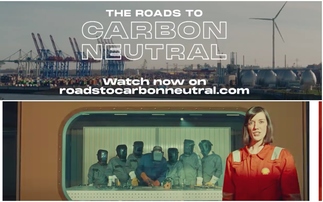Driving the green economy forward takes hard work and commitment, and winning a BusinessGreen Leaders Award is no different - but these top tips can help
Over the past seven years, hundreds, if not thousands, of companies have competed for a BusinessGreen Leaders Award. And as green businesses have gone from strength to strength and the awards have grown to become the most prestigious event in the green economy's calendar, the competition has become ever fiercer. With a week to go to this year's entry deadline, 2017 is likely to be no different.
Right from the start of the awards in 2011, one of the most common questions we are asked is what makes the winners and highly commended companies and individuals stand out - what makes a successful entry? And why should we enter in the first place?
That second question is easy to answer. Why would you not want to be recognised for the exemplary work you do in advancing the green economy? Making the shortlist helps your company stand out from the crowd, provides valuable marketing collateral and promotional material, is fantastic for company morale, and provides a great evening for you to celebrate with your colleague, clients, and partners.
But how do you maximise your chances of first making the shortlist, and then, perhaps, walking away victorious on the night? After all, spending time on an entry only to not make the shortlist is the most frustrating part of any awards process.
Having read all those entries over the years, we can offer some invaluable tips to ensure you present your many green business achievements in the best light possible.
Tip one: Have confidence
Make the decision to enter and stick with it. It is obvious, but you have to be in it to win it. Don't think you are not big enough to qualify, over the years companies of all shapes and sizes have enjoyed success at the awards. The BusinessGreen Leaders Awards are open to ALL companies, and everyone has an equal chance. Winners are chosen on entry quality, not how big they are or how long their track record is, so be confident that you have a good shot.
Tip two: Seek advice from colleagues
If you are keen to enter it is worth organising a short session with colleagues to come up with as many examples of your success and strengths that you can think of. This will help ensure you select the category or categories where you are strongest and determine which examples, facts, figures and stories you should include. Then when you have drafted your entry share it with colleagues again to get their feedback and ensure you haven't missed anything.
Tip three: Read the category criteria
Take a few minutes to read the category criteria properly before and after starting an entry. It is more helpful than you may think and contains hints and tips on what the judges are looking for in every entry.
Tip four: Tell a story
Human beings are story-telling animals and it is far easier to process information if it forms some kind of narrative. That doesn't mean you have to write War and Peace, but if you can explain through the entry how a company, project or team was born, what its mission was, what motivated it, what obstacles it overcame, what impact it had, and how it succeeded in the end, then it will help catch the judges' attention. No story is more inspiring, nor more relevant to the green economy, than striving to overcome challenges in pursuit of success.
Tip five: Don't forget the human interest
All organisations are groups of people and it is those people that make a business, team, or project a success. The judges will always respond to stories about the individuals involved, what inspires and excites them, how your team works together, and how it inspires others. It is also important to have fun with the entry. The judges are reading thousands of words of text so a real sense of the personalities behind an entry can help it stand out. If you enjoyed creating the entry, then it is more likely the judges will enjoy reading it.
Tip six: Keep it relevant
You don't have that many words to present your achievements, motivations, and plans for the future, so don't waste any of them on superfluous information. We want to hear about your best projects and proudest moments, not everything an organisation has ever done. Equally, don't forget which category you are trying to compete in. Boilerplate information can help remind the judges what you do, but it may not add that much to your chances of winning in a specific category.
Tip seven: Don't forget the facts and remember the basics
When discussing entries it is the impressive facts and figures that most often catch judges' attention. If you can back up claims about a company, team or project with clear evidence of the positive results it achieved then that will always resonate. As importantly, don't forget the basic information that should feature in every entry: who, what, where, when, why, and how. This is essential to every entry, but is especially important for cutting-edge technologies or projects. Many times in the past the judges have read an entry that sounds impressive, but then asked: 'What exactly is it? What does it do?' Don't forget to clearly explain what you did and how and why you did it.
Tip eight: Stick to the word count (and the other rules)
The word count is there for a good reason and it is definitely advisable to stick to it. It is always possible to get all the essential information across in a single entry and if you submit a 5,000 word dissertation it will likely serve to put the judges off. Equally, remember the awards are for companies with a UK presence.
Tip nine: Testimonials and supporting material
A good testimonial goes a long way and really underlines the impact an individual, a company or a project has had. You don't want too many and just a sentence of two will do, but third party backing for your entry is likely to stand out. Equally, taking advantage of the opportunity to submit some supporting material can really help. Many green projects or clean technology innovations have highly visual elements and as such photos, infographics, and videos can all help give the judges a better appreciation of what your entry is describing.
Tip ten: Read the T&Cs, meet the deadline, and don't forget to proof-read!
Like anything in life, it is always advisable to read the T&Cs and meet the deadline. Planning ahead to meet the deadline will make the process far less stressful and increase the chances of you submitting a carefully considered entry. Similarly, try to take the time to give the final entry a quick proof read to spot those last typos and ensure you cover all the points you want to make. Finally, don't forget to double-check the T&Cs and ensure your colleagues are supportive of the entry and are keen to attend the awards if you are lucky enough to be shortlisted.
If you follow these simple tips it should increase the chances of you making that shortlist and joining us for the UK's most prestigious green business awards - not to mention walking away with an award on the night!
You can enter the BusinessGreen Leaders Awards 2017 here.










